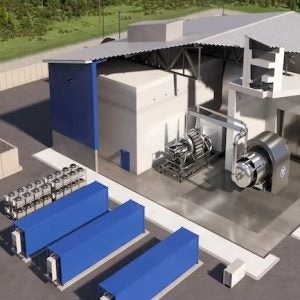British Energy (BE) and Atomic Energy of Canada (AECL) have consolidated their agreement to begin an assessment into the feasibility of using Candu technology in the UK.
In its submission to the government’s energy review, BE has made a case for replacing its existing nuclear capacity in the UK with either Candus, or the Westinghouse-designed AP1000. The company has said that both technologies will be developed in time to meet a programme of commissioning ten 1000-1200MWe units between 2010 and 2025. This work will reveal the regulatory and licensing issues involved if the company opted for a Candu design. It will also provide cost estimates for the ten new stations that BE proposes will be built with private finance.
The two companies will:
• Prepare a case including Candu as an option for new plants in the UK.
• Assess the technical suitability of Candu reactors on existing sites.
• Prepare a business model that addresses issues such as launch costs, risk sharing, economics and government support.
• Document key factors associated with Candu implementation and recommend an implementation strategy.
BE now operates four Candu units at the Bruce B station in Ontario, Canada, and plans to re-open two shutdown units at the Bruce A site. The company completed the transaction to lease the Bruce plants last year. Its expansion into the US delivered a profit of £87 million for the first half of 2001/2002, but although its overall losses of £17 million for the six months to September 30 have been reduced from losses of £56 million over the previous period, Robin Jeffrey, BE’s chairman, has warned that the future of its home business is in trouble without government action. Jeffrey has urged ministers to approve the development of new capacity and to take responsibility for reprocessing.
“If the UK arrangements for spent fuel were to apply in North America we would be making a loss there and if the US arrangements were to apply in the UK, we would be in profit there,” he said. “Reprocessing is no longer the most cost effective option for spent fuel and shareholders should no longer be required to shoulder this burden,” he added.
Meanwhile, BE has said it would like to buy the nuclear assets of the Czech-owned power utility CEZ, which is due for privatisation. “We are interested in the CEZ nuclear plants,” said Robin Jeffrey at a news briefing held after the release of the company’s interim results. But he added that the Czech government had rebuffed BE’s interest, which stops at the utility’s nuclear assets.
The Czech government is selling off CEZ as a package of generation, transmission and distribution assets. Electricité de France is widely seen as the front-runner in the tender. Other runners include Italy’s Enel, Spain’s Ibderola and a group combining US-based NRG Energy and the UK’s International Power. Belgium’s Electrabel pulled out of the tender in October.






